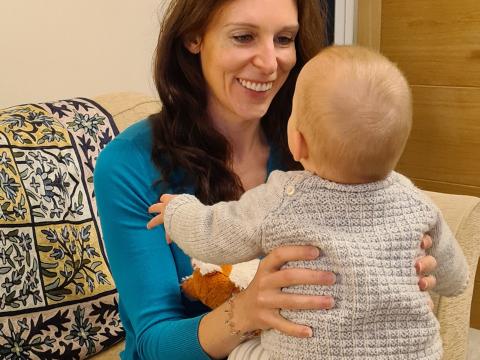
What my baby taught me about managing crises
After a lifetime of working in security and risk, World Vision's Frances Andrews shares six lessons about security operations that she learned from having her first child.
I thought I knew everything about crisis management—then I had a baby.
When I found out I was pregnant, my husband and I were thrilled. We read the books, took the classes, and prepared for parenthood like we were prepping for a major security event. I mean, I handle crises for a living—how hard could it be? Well, as it turns out, babies don’t follow protocols. They haven’t read the books.
Here are a few things my son taught me about life and work during my maternity leave.
1. Using Information: Head vs. Heart
Both my husband and I are former analysts, so naturally our approach to parenting was “data-driven”. We read, researched, and consulted experts (mostly family members and friends with “well-behaved” kids). From food restrictions to sleeping positions to exercise do's and don'ts, we encountered a lot of contradictory advice.
In the end, I realised that making informed decisions was all about balancing the quality of the data available with the ability to interpret it correctly. Not every piece of advice is backed by solid evidence, and much of it can be contradictory or based on myths. We learned to critically evaluate the information, apply it to our specific situation, and weigh up the risks and benefits logically. This mirrors my role in security, where decisions are often based on incomplete data. What matters is making the best possible decision with the information you have, understanding the risks, and accepting the potential outcomes.
2. Adapt Your Plan (Because Babies Don’t Care About It)
In the UK, they ask you to fill out a birth preference plan detailing whether you want whale-song soundtracks or your partner shouting motivational quotes while feeding you protein bars. Naturally, I made my plan, feeling confident I’d nailed it. Spoiler alert: things did not go exactly according to plan.
Much like in crisis management, having a plan is important, but flexibility is crucial. We had so many ideas about how we’d handle things as parents, but once our son arrived we had to alter about half of them. It’s important to plan ahead, but if the plan’s not working, identify why, and adapt—whether it’s your birth plan or your crisis response strategy.
3. Sleeplessness Leads to Senselessness
Ah, sleep. Remember that? My son’s been a fantastic sleeper (I don’t tell the other mums that) but still, the early months took a toll. I quickly discovered that sleep deprivation makes for some questionable decisions and behaviours. Case in point: for several weeks I routinely forgot to buy key items which were on the shopping list; I just didn’t seem to see them on the list.
At work, stress and exhaustion can cloud your judgement too. In a crisis, you need someone who can step back, assess the situation clearly, and help you reset before you make any more stress-induced decisions.
4. New Perspectives: Every Time is the First Time
Watching my son experience the world for the first time is pure magic. He’s amazed by things I take for granted: the sound of someone singing, the feel of grass, the sight of a dog. But it’s also a reminder that new things can be overwhelming, especially when you have no context for them. Sometimes he overreacts to what seems like nothing—but to him, it’s a big deal.
This applies to security too. We get used to dealing with risks and crises, but for others, these situations are brand new and can be terrifying. Taking the time to see things from other perspectives helps us anticipate and manage those reactions better.
5. Letting Go: Delegation is Key
Before my maternity leave, I worried about how my workload would be handled in my absence. As much as I trusted my team, it’s hard to let go of control. But when you have a capable team that you really trust, stepping back becomes a lot easier. Turns out, they did a great job without me (I’m trying not to take it personally).
This lesson is crucial in crisis management as well. Trusting your team to handle their roles without micromanaging is essential for success. You can’t do everything yourself, and sometimes stepping away is the best decision you can make.
6. Work-Life Balance: There’s a Season for Everything
Here’s a shocker: I didn’t miss my job at all during maternity leave—even though it’s the best job I’ve ever had. Spending time with my son was a wonderful reminder that the work-life balance is fluid. There are seasons when work takes priority and seasons when family does. Maternity leave gave me the chance to fully focus on my family, and I realised that what counts as “balance” changes over time.
I’m hoping that these lessons stick with me as I return to work. They’ve made me a better mum—and I think they’ll make me a better colleague too.
Frances Andrew is World Vision International's Director, Security Operations

